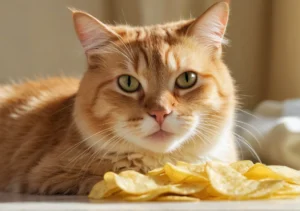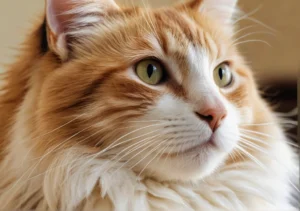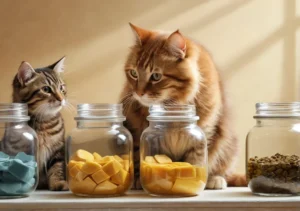Cats have some mysterious habits, from knocking things off tables to chasing invisible bugs. One particularly strange behavior is their tendency to eat ashes. But why do cats eat ashes? Let’s explore the reasons behind this puzzling feline behavior.
Have you ever caught your cat munching on ashes from the fireplace or barbecue pit? While it may seem odd, there are actually several reasons why cats are drawn to ashes. Let’s delve into the mysterious world of feline behavior and uncover the truth behind why cats eat ashes.
Natural Instincts
Cats are curious creatures by nature, always on the prowl for new experiences and sensations. This innate curiosity often leads them to explore unusual substances, such as ashes. Just like how humans use their taste buds to discover new flavors, cats use their sense of taste to investigate unfamiliar textures and flavors. So, when you catch Fluffy licking ashes, it’s likely just their way of satisfying their natural instinct to investigate the world around them.
Mineral Deficiency
While cats are known for being picky eaters, they can sometimes seek out unusual substances to supplement their diet with essential minerals. Ashes contain trace amounts of minerals like calcium and potassium, which are crucial for maintaining a healthy feline body. If your cat is lacking these minerals in their regular diet, they may be drawn to ashes as a way to fulfill their nutritional needs. However, it’s important to note that ashes are not a complete or balanced source of nutrients for cats and should not be relied upon as a dietary supplement. Remember to consult with your veterinarian to ensure your cat is getting all the necessary nutrients in their meals.
Additional Insight:
Keep an eye on your cat’s behavior and diet to ensure they are getting all the essential nutrients they need. If you suspect that your cat is eating ashes due to a mineral deficiency, consider consulting with your vet to address any dietary imbalances and provide proper supplementation. Your furry friend’s health and well-being should always be a top priority.
Pica Disorder
Have you ever caught your furry friend munching on ashes and wondered why? Well, one possible reason could be pica disorder. This medical condition causes cats to eat non-food items, like ashes, due to a nutritional deficiency. Cats with pica may also show interest in eating other unusual items, so it’s essential to consult your veterinarian if you suspect your cat has this disorder. They can provide guidance on managing pica and ensuring your cat’s nutritional needs are met.
Behavioral Issues
When your cat starts snacking on ashes, it might not be due to a physical condition like pica disorder but rather behavioral issues. Stress, anxiety, or boredom can lead cats to engage in unusual behaviors like eating ashes. If you notice your cat displaying abnormal eating habits, consider whether there have been any recent changes in their environment or routine. Providing mental and physical stimulation through toys, playtime, and enriching activities can help alleviate stress and prevent these behaviors. Remember, a happy cat is a healthy cat!
Additional Insight:
Healthy Diet: Ensuring your cat is receiving a balanced diet with all necessary nutrients can also help reduce the likelihood of them developing pica or engaging in other abnormal eating behaviors. Consult with your veterinarian to determine the best diet for your feline friend and make sure they are getting all the essential nutrients they need to thrive.
Seeking Warmth
Some cats may be drawn to ashes for their warmth, especially if they were recently burning and still emit heat. Cats have a natural affinity for cozy and warm spaces, making them curious about seemingly warm objects like ashes from a fire. This behavior is rooted in their instinct to seek out comfortable spots for relaxation.
To prevent your cat from potentially ingesting harmful ashes for warmth, ensure that all fireplaces, candles, or other sources of heat are kept safely out of reach. Consider providing your cat with cozy beds or blankets in areas where they like to rest to satisfy their need for warmth without the risk of ash consumption. Engaging your cat in play or exercise can also help keep them warm and occupied, reducing their interest in investigating potentially dangerous materials.
Tips for Prevention
There are several practical tips for cat owners to prevent their feline friends from eating ashes and potentially harming themselves. Firstly, ensure all fireplaces, stoves, and other sources of ashes are securely covered when not in use to prevent access. Secondly, regularly clean and dispose of ashes properly to remove any temptation for your curious cat.
Additionally, providing your cat with plenty of stimulating toys, scratching posts, and interactive playtime can help redirect their attention away from ash consumption. Creating a comfortable and warm environment for your cat with cozy beds and blankets can also reduce their desire to seek warmth from hazardous sources like ashes. Remember that prevention is key to keeping your cat safe and healthy.
- Keep all sources of ashes tightly covered
- Regularly clean and dispose of ashes safely
- Provide stimulating toys and playtime for your cat
- Create a cozy and warm environment with comfortable bedding
Remember, a little proactive prevention can go a long way in keeping your feline friend safe and healthy.
Fun Facts About Cats and Ashes
Cats eating ashes may seem peculiar, but there are some interesting reasons behind this behavior. One theory suggests that ashes contain minerals that cats instinctively crave to aid their digestion. Another fun fact is that ashes might mimic the texture of cat litter, leading cats to consume them accidentally while attempting to groom themselves.
Conclusion: Alternatives for Feline Enrichment
Instead of ashes, consider providing your feline friend with safe alternatives to satisfy their natural behaviors. Interactive toys, puzzle feeders, or even cat trees can offer mental stimulation and physical exercise for a happy and healthy cat. Remember, understanding your cat’s instincts and providing appropriate outlets is key to their overall well-being.
Alex, a passionate animal lover, has experience in training and understanding animal behavior. As a proud pet parent to two dogs and three cats, he founded AnimalReport.net to share insights from animal experts and expand his knowledge of the animal kingdom.




